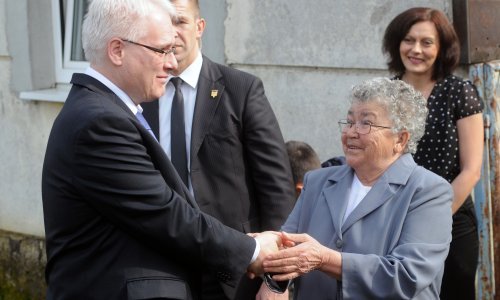President Ivo Josipovic said on Monday that the referendum on Croatia's EU entry would be held on 22 January 2012, and that he expected Croatian diplomats after the referendum to tour European countries to lobby for the fastest possible ratification of the country's Accession Treaty.
In an interview with Croatian Radio, Josipovic said that there would be enough time until January 22 to inform citizens of what EU membership would bring. He agreed that the public had not been informed adequately during the negotiating process, adding that "there's no use in crying over spilt milk" and that one should rather focus on completing the accession process.
"A month is enough time to obtain information on the matter, for everyone who has an interest there is information," he said.
Josipovic admitted that there were shortcomings in the referendum legislation, but that there was no time now for legislative changes and that he did not believe that anyone thought the state would "cheat" in the referendum.
"I don't believe the referendum will be deficient in terms of democracy," the President said, adding that he expected the referendum question to be simple, like "Are you in favour of Croatia's membership of the EU?"
"People should not be misled into believing that EU membership will solve all our problems. It is a big opportunity, but whether we will make the most of it or be less successful is up to us," Josipovic said, adding that one should consider the consequences for Croatia's future when deciding on its entry into the EU.
"Croatia is not Switzerland or Norway which have regulated their status as if they were EU members."
Josipovic said he expected the new government to build its strategy for overcoming the crisis not only on saving money and restricting spending, but also on the readiness and ability to create jobs and launch business cycles, attract investments and enable economic growth.
"Development is the key," he said, adding that one should not only look at big foreign investors, but also give room to domestic, smaller investors which he said could definitely help in economic development.
Asked about reasons for the convincing victory of the centre-left Kukuriku coalition in the December 4 elections, Josipovic said he believed that citizens had realised that changes were necessary due to the economic crisis, and that "there was certain fatigue in relation to the party which has been in power for a long time."
Regardless of the election winner, the elections were held in a very democratic atmosphere, "the campaign was not nearly as dirty as expected," Josipovic said, adding that this was a step forward in democracy.
When asked to comment on objections from the Croatian Democratic Union that the media had sided with the Kukuriku coalition, sending wrong messages to voters, Josipovic said there were media and reporters "rooting for this or that party", but that citizens had the right to know about suspicions about possible criminal activities involving the HDZ and its senior officials.
He confirmed reports that some of the staff working in his office would leave for positions in the new government, like Predrag Matic, Josko Klisovic and Visnja Tafra, which he said proved that he had recruited top professionals with whom he would continue to cooperate.
Asked how he saw the stability of the new government, in light of frequent strong-worded statements by future Deputy Prime Minister Radimir Cacic directed at reporters, Josipovic said that he believed members of the government would cooperate well with one another. As for Cacic, he said: "He made some not so fortunate statements, but he is responsible for them as a politician, all politicians should be aware of the need to have fair, benevolent relations with the media."
Asked about the situation in the Croatian football community following recent arrests and corruption charges, Josipovic said that in professional sports, as in any other business, one should follow the saying "short reckonings make long friends", meaning that those running a business pay taxes and do not run their business "at the expense of society".


































